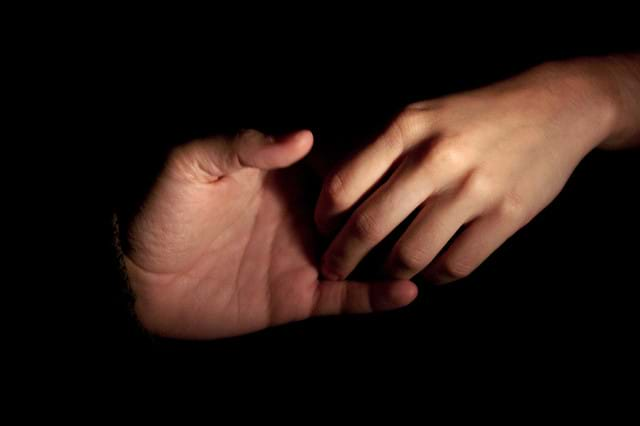The Benefits of Human Touch
You’ve probably heard about the studies and heartbreaking stories of babies who are not touched, cuddled, kissed or given enough human affection. They don’t usually fare as well physically, emotionally or socially as those who are shown genuine love and physical affection.
One study that I recently came across found that premature infants who were massaged for 15 minutes three times a day gained weight 47 percent faster than infants who were left in their incubators and did not receive this level of human contact.
Additionally, the nervous system of the massaged infants showed more positive signs of maturing, and these babies were also reportedly more active and responsive. Six months after the study, they continued to thrive at a greater rate and were released from the hospital earlier than those who did not receive that extra physical attention.
We all know how important human contact is to babies and children, but what about adults? What happens to that primal need as we get older?
Over the course of my 15 years as a psychotherapist, I’ve had clients tell me that they’ve learned to simply ignore or “manage” their needs for human contact. Some have said that they’ve accepted that “it’s not part of their life anymore.” Well, that simply won’t do. Why choose to miss out on one of life’s great pleasures and the health benefits that come with it?
The truth is that touch— even a rub of the shoulder, a pat on the back or the squeeze of a hand - strengthens relationships, helps to increase cooperation and brings people closer. On a physical level, pressure receptors are stimulated which help lower stress hormones. During a good hug, you’re also helping to promote the release of oxytocin “the cuddle hormone.” Emotionally, touching helps make people feel safer and more secure with each other. And when it comes to romantic partnerships, it’s an essential indicator that the bonds are healthy and strong. Longtime couples who still hold hands, sit close to each other and reach out for frequent contact, generally aren’t the ones who wind up in my office for therapy.
Of course we live in a culture that does not rank high on the touching charts. Australians might rough house, give a brisk pat on the back and a quick handshake, but, for the most part, many feel awkward about physical contact. When I’m in France I find myself observing the easy warmth that’s exhibited between people - the tendency for the French to pull you close, kiss both cheeks and give you a big embrace whether you’re a man or woman, whether they know you well or are just acquainted. We pick up on these cultural cues and often conform.
And of course there’s the workplace culture to navigate. In a corporate environment, touching among colleagues is generally not encouraged unless it’s a handshake.
So, we Aussies and business people have to stretch a bit further out of our comfort zone when it comes to reaping the wonderful physiological benefits of touch. The good news is, it’s never too late to start. And there’s also this: You can’t touch another without receiving the benefits of human contact yourself. When you’re the one reaching out for a hug or a hand, you’re equally receiving the physical benefits, plus the psychological benefits of giving. Touching is a gift that gives back simultaneously.
With that said, there are some people who just don’t like to be touched by anyone, except perhaps their spouse or girlfriend or boyfriend. That’s OK too. I only request that you entertain the idea of it and to acknowledge the benefits.
Reach out today, my personal challenge.
If you feel human contact is a bit lacking, what would happen if you incorporated a little more touching in your life? I encourage you to find out.
For the next week, take some baby steps. Give longer, more meaningful hugs to those close to you. If someone is sharing an emotional story, reach out with a squeeze of her hand or shoulder. Pat the back of a friend and let him know you’re glad to see them. Give your romantic partner an unexpected neck massage or tender caress, and make time for love making. Hold hands when walking side-by-side.
Make each point of contact a conscious act that is genuine and appropriate. Be mindful of how you feel about touching as time goes on. Note how increased human contact makes you feel overall, and notice its affect on your relationships over time.
Feel free to share your experience with me in therapy or by posting a comment. In the meantime, here are some questions for self-reflection and assessment. All questions refer to non-sexual touching.
-
Generally speaking, do you like to be touched by friends and family members?
-
Is it common practice to hug each other as a greeting or way of comfort? If so, are the hugs nurturing and sincere or formal and quick?
-
What about kisses on the cheek? Is that common practice among your circle of friends and family?
-
Do you find yourself reaching out to hold someone’s hand or rub someone’s shoulder to comfort him or her? Do you find those around you do the same?
-
Do you recall being held often and coddled as a child? What was the touching culture in your home like growing up?
-
As a parent, what kind of touching culture are you establishing with your children?
-
Do you and your romantic partner often reach other affectionately outside of the bedroom?
-
What about pets? Do you constantly pet your dog or cat, give him or her tummy rubs and back massages? Does it make you feel good when doing so? What effect does it have on your pet?

